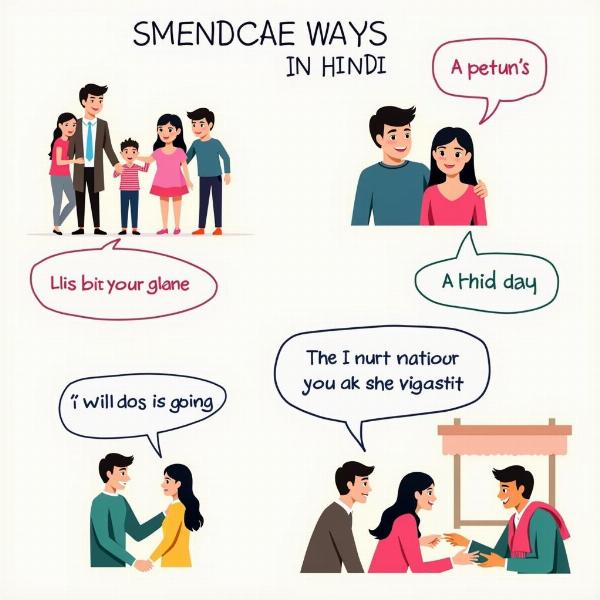Understanding the nuances of wishing someone well in Hindi adds depth to your interactions and demonstrates cultural sensitivity. “Have a nice day ahead” is a common English expression, and while a direct translation exists, grasping the cultural context allows for more meaningful communication. This article explores the various ways to convey this sentiment in Hindi, delving into their subtle meanings and appropriate usage.
Exploring “Have a Nice Day Ahead” in Hindi
While a literal translation of “Have a nice day ahead” might be “आपका आगे का दिन शुभ हो” (aapkaa aage ka din shubh ho), this phrasing sounds quite formal and isn’t commonly used in everyday conversations. Indians prefer more concise and contextually relevant expressions. So, what are the preferred ways to say “have a nice day ahead” in Hindi?
Common Hindi Phrases and Their Contexts
-
“अच्छा दिन बिताएं” (achchha din bitaaen): This translates to “Have a good day” and is the most common and versatile equivalent. It’s suitable for most situations, from casual interactions with friends to formal conversations with colleagues.
-
“शुभ दिन” (shubh din): Meaning “Good day,” this phrase carries a slightly more traditional and respectful tone. It’s often used in formal settings or when addressing elders.
-
“दिन अच्छा बीते” (din achchha beete): Similar to “achchha din bitaaen,” this phrase wishes someone a good day and is suitable for both formal and informal settings.
-
Context-Specific Phrases: Depending on the time of day or the specific situation, other phrases might be more appropriate. For example, “शुभ प्रभात” (shubh prabhaat – good morning) or “शुभ संध्या” (shubh sandhya – good evening) are used for morning and evening greetings, respectively.
 Wishing Someone a Good Day in Hindi
Wishing Someone a Good Day in Hindi
Beyond Literal Translations: Understanding Cultural Nuances
Indian culture emphasizes respect and warmth in communication. Therefore, the specific phrase used can depend on the relationship between the individuals, their age difference, and the social context. Using a more formal phrase with a close friend might feel distant, while using an informal phrase with an elder might be considered disrespectful.
Choosing the Right Phrase: Practical Examples
Imagine you’re leaving your workplace. Saying “achchha din bitaaen” to your colleagues is perfectly appropriate. However, if you’re leaving your grandparents’ house, using “shubh din” or even adding a respectful suffix like “ji” (e.g., “shubh din ji”) would be more culturally appropriate.
Why “Have a Nice Day Ahead” Isn’t Directly Translated
The English phrase “Have a nice day ahead” focuses on the future aspect of the day. While this sentiment is implied in Hindi greetings, it’s not explicitly stated. Hindi greetings focus more on the overall well-being and positivity of the day rather than just the future portion.
Communicating Effectively in Hindi
Mastering these subtle nuances can significantly enhance your communication in Hindi. It shows respect for the culture and helps build stronger relationships. Don’t be afraid to ask native speakers for guidance – they’re usually happy to help!
Conclusion
While “have a nice day ahead” doesn’t have a direct equivalent in Hindi, several phrases effectively convey the sentiment of wishing someone well. By understanding the cultural context and choosing the appropriate expression, you can communicate more effectively and build stronger relationships. Remember, the key is to be mindful of the social setting and your relationship with the person you’re addressing. So, the next time you want to wish someone well, use one of these Hindi phrases and make your interactions more meaningful.
FAQ
-
What is the most common way to say “have a nice day” in Hindi? The most common way is “achchha din bitaaen.”
-
Is “shubh din” formal or informal? “Shubh din” is considered more formal and respectful.
-
Can I use “shubh prabhaat” in the afternoon? No, “shubh prabhaat” is specifically a morning greeting.
-
What does “ji” add to a greeting? “Ji” adds a suffix of respect, often used when addressing elders.
-
Why is understanding context important when using Hindi greetings? Context determines the appropriateness of different phrases, showing respect for cultural nuances.
-
Where can I learn more about Hindi greetings? You can find more information online, in language learning books, or by interacting with native Hindi speakers.
-
Is it okay to ask a native speaker for help with Hindi phrases? Absolutely! Most native speakers are happy to help you learn their language.
happy morning meaning in hindi
Meaning-Hindi.in is your trusted partner for all your Hindi translation needs. We offer a comprehensive suite of services, including business and commercial document translation, certified and legal document translation, technical and user manual translation, website and localization services, educational and academic document translation, express translation, and specialized industry translations. Our team of expert Hindi linguists ensures accurate, culturally sensitive, and high-quality translations. For professional and reliable Hindi translation services, contact us at [email protected] or +91 11-4502-7584. Meaning-Hindi.in is ready to assist you with all your language needs.